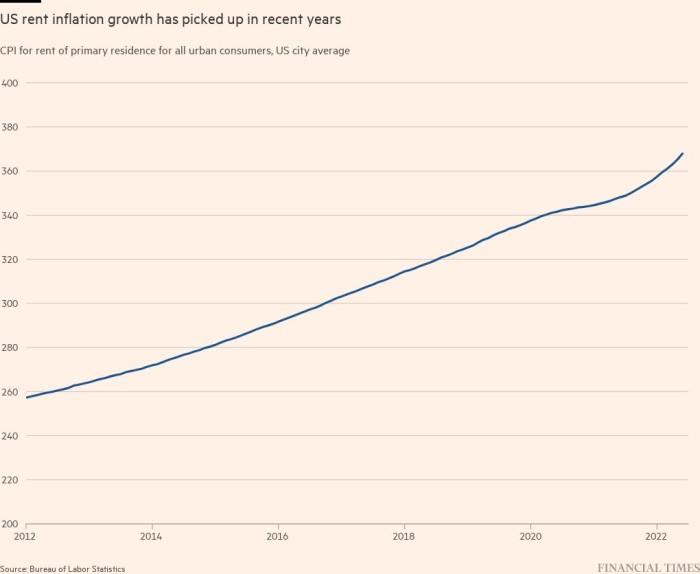In Eric Farmelant’s nearly decade-long career as a real estate broker in Miami, he had never witnessed renters engage in bidding wars over rental properties until the coronavirus pandemic fuelled scorching demand for beachfront housing in Florida. He can no longer show four or five listings to clients because many of the properties are being rented sight unseen.
“You’re seeing renters putting down a year’s worth of rent up front to get their offer accepted,” said Farmelant, who works for Ibis Realty Group.
Rents, in turn, are up nearly 40 per cent since January 2021, according to Apartment List, indicative of a broader trend that has gripped the country.
For realtors, double-digit rent increases have been a boon for business. For the Federal Reserve, they serve as yet another hurdle in the central bank’s quest to get the worst inflation problem in decades under control.
With little relief expected in the near term, economists warn elevated rents will act as an accelerant, maintaining upward pressure on inflation even as consumer price growth stalls for other categories. It makes the US central bank’s job of tackling soaring prices all the more difficult.
“It’s going to be hard to say ‘we’ve got inflation under control’ if you still have shelter costs continuing to march higher,” said Sarah House, senior economist at Wells Fargo. She expects lofty rental inflation to persist until at least the end of the year, and despite some offsetting moderation in other goods and services, “that will complicate the task ahead for the Fed”.
Top officials pay close attention to housing-related inflation, given that it is such a significant component of overall inflation.
By some estimates, shelter costs make up about a third of the consumer price index, which in June rose at an annual pace of 9.1 per cent, according to the Bureau of Labor Statistics, in what was the fastest such increase since November 1981. For the “core” measure, which strips out volatile items such as food and energy, it makes up over 40 per cent.
Compared to the same time last year, rents rose 5.8 per cent after the biggest monthly jump since 1986 of 0.8 per cent. Owners’ equivalent rent, a measure of what homeowners believe their properties would rent for, rose 0.7 per cent. In all, shelter costs are up 5.6 per cent over the past 12 months, the most since 1991.
The larger-than-forecast acceleration has reset expectations about how quickly headline inflation can moderate this year and how much more monetary policy tightening may be forthcoming. The Fed has said it needs to see a clear deceleration in monthly inflation data before significantly slowing the pace at which it is raising interest rates.
Forecasts for rent inflation hinge in large part on the trajectory of home prices, which surged during the pandemic as people reshuffled their lives in a new era of working from home, sought out less dense locales and took advantage of ultra-low mortgage rates. As more prospective buyers were priced out of the market, they turned to rental options.
Now buyers are being priced out for a different reason. Home prices are beginning to moderate after hitting another record in June, according to data released by the National Association of Realtors on Wednesday. But the cost to finance that purchase through borrowing has skyrocketed as the Fed has jacked up interest rates.
According to Realtor.com, the gap between monthly starter home ownership costs and rents has widened by roughly 25 percentage points, or nearly $500. In June alone, the NAR reported sales of previously owned homes were down 5.4 per cent, or 14 per cent from a year earlier.
“People who have been priced out of the for-sale housing market are increasingly turning to the rental market and that also pushes up demand,” said Daryl Fairweather, chief economist at Redfin.
Coupled with the fact that rental prices trail home price changes by about 18 months, Kathy Bostjancic, chief US economist at Oxford Economics, said rental inflation may not moderate until the second quarter of 2023.
Economists such as Ryan Wang at HSBC have revised higher their forecasts, pencilling in rental inflation on a year-over-year basis to top 7 per cent by early next year.
“New leases are being contracted at much higher rent levels than before, and this is leading to increases in the overall universe of rents as measured in the CPI,” he said.
Given the way BLS calculates the rent data, the broader inflation effects can also take time to show up in the official figures. Michael Pond, head of global inflation-linked research at Barclays, reckons the lag can be anywhere between six and nine months.
In February, researchers at the Fed’s San Francisco branch estimated that current rental market trends would increase overall CPI inflation by an additional 1.1 percentage points in both 2022 and 2023, or 0.5 percentage points to the central bank’s preferred inflation gauge, the personal consumption expenditures index. So far, those predictions have held up.
What could help ease some of these pressures is increased housing supply, which the Biden administration is prioritising. But economists and housing experts say those efforts do little to alleviate the immediate problem.
“We don’t have enough housing. Even if you’re building over half a million units,” said Danushka Nanayakkara-Skillington at the National Association of Home Builders. Soaring material costs for builders are also being passed down to tenants, she said.
Realtors and real estate investors are most wary of a recession, which economists predict next year, as the Fed follows through on its “unconditional” commitment to restoring price stability. For Tom Porcelli, an economist at RBC Capital Markets, housing is already likely “just at the beginning of a recession”.
“We are in store for a period of stagnating economic growth because of the interest rate increases the Fed is doing,” added Redfin’s Fairweather.
“That will drive down price growth for basically everything, including rent. But it will just take a while for that to trickle down.”





